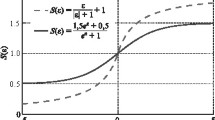Abstract
We study the control problem for dynamic plants operating under uncertainty, in particular, in the case of unmeasurable external disturbances of coordinate and operator types. The complexity of such a problem essentially increases under the assumption of rapidly varying parametric disturbances. The problem of constructing efficient control algorithms in this case remains unsolved. We present a brief survey of known control methods for dynamic plants subjected to various disturbances. To solve the control problem in the case of rapidly varying parametric disturbances, we suggest an approach based on the binarity principle, which permits one to introduce new types of feedback, in particular, a coordinate-operator feedback; in turn, this feedback permits one to synthesize controllers providing the small sensitivity of the closed-loop plants to coordinate and parametric disturbances varying arbitrarily rapidly.
Similar content being viewed by others
References
Emel’yanov, S.V. and Korovin, S.K., Novye tipy obratnoi svyazi. Upravlenie pri neopredelennosti (New Types of Feedback. Control under Uncertainty), Moscow: Nauka, 1997.
Podchukaev, V.A., Teoriya avtomaticheskogo upravleniya (Theory of Automatic Control), Moscow, 2004.
Polyak, B.T. and Shcherbakov, P.S., Robastnaya ustoichivost’ i upravlenie (Robust Stability and Control), Moscow, 2002.
Lur’e, A.I., Nekotorye nelineinye zadachi teorii avtomaticheskogo regulirovaniya (Some Nonlinear Problems of the Theory of Automatic Regulation), Moscow-Leningrad: Gosudarstv. Izdat. Tekhn.-Teor. Lit., 1951.
Popov, E.P., Teoriya nelineinykh sistem avtomaticheskogo regulirovaniya i upravleniya (Theory of Nonlinear Systems of Automatic Regulation and Control), Moscow: Nauka, 1979.
Kim, D.P., Teoriya avtomaticheskogo upravleniya (Theory of Automatic Control), Moscow, 2004.
Petrov, B.N., Rutkovskii, V.Yu., Krutova, I.N., and Zemlyakov, S.D., Printsipy postroeniya i proektirovaniya samonastraivayushchikhsya sistem upravleniya (Principles of Construction and Design of Self-Adjusting Control Systems), Moscow, 1972.
Glumov, V.M., Zemlyakov, S.D., and Rutkovskii, V.Yu., Adaptive Coordinate-Parametric Control for Nonstationary Plants: Some Results and Directions of Development, Avtomat. i Telemekh., 1999, no. 6, pp. 100–116.
Zemlyakov, S.D. and Rutkovskii, V.Yu., On Some Results on the Combined Use of Principles for the Construction of Systems with Variable Structure and of Adaptive Systems with a Reference Model, Avtomat. i Telemekh., 1999, no. 5, pp. 67–77.
Meerov, M.V., Sintez sistem avtomaticheskogo regulirovaniya vysokoi tochnosti (Synthesis of Systems of High-Accuracy Automatic Control), Moscow, 1967.
Emel’yanov, S.V., Sistemy avtomaticheskogo upravleniya s peremennoi strukturoi (Automatic Control Systems with Variable Structure), Moscow: Nauka, 1967.
Khalil, Kh.K., Nelineinye sistemy (Nonlinear Systems), Moscow-Izhevsk, 2009.
Uskov, A.A. and Kruglov, V.V., Intellektual’nye sistemy upravleniya na osnove metodov nechetkoi logiki (Intelligent Control Systems on the Basis of Methods of Fuzzy Logics), Smolensk, 2003.
Spravochnik po teorii avtomaticheskogo upravleniya (Reference Book on Automatic Control Theory), Krasovskii, A.A., Ed., Moscow, 1987.
Tsypkin, Ya.Z., Osnovy teorii avtomaticheskikh sistem (Foundations of the Theory of Automatic Systems), Moscow: Nauka, 1977.
Kim, D.P., Teoriya avtomaticheskogo upravleniya (Automatic Control Theory), Moscow, 2004, vol. 1.
Fomin, V.I., Fradkov, A.L., and Yakubovich, V.A., Adaptivnoe upravlenie dinamicheskimi ob”ektami (Adaptive Control of Dynamic Plants), Moscow: Nauka, 1981.
Liberzon, L.M. and Rodov, A.B., Sistemy ekstremal’nogo regulirovaniya (Systems of Extremal Regulation), Moscow, 1965.
Krasovskii, A.A., Dinamika nepreryvnykh samonastraivayushchikhsya sistem (The Dynamics of Continuous Self-Adaptive Systems), Moscow, 1963.
Rastrigin, L.A., Sistemy ekstremal’nogo upravleniya (Extremal Control Systems), Moscow: Nauka, 1974.
Author information
Authors and Affiliations
Corresponding author
Additional information
Original Russian Text © S.V. Emel’yanov, A.S. Fursov, 2014, published in Differentsial’nye Uravneniya, 2014, Vol. 50, No. 11, pp. 1477–1497.
Rights and permissions
About this article
Cite this article
Emel’yanov, S.V., Fursov, A.S. Mathematical foundations of the theory of coordinate-operator feedback. Diff Equat 50, 1472–1494 (2014). https://doi.org/10.1134/S0012266114110068
Received:
Published:
Issue Date:
DOI: https://doi.org/10.1134/S0012266114110068



